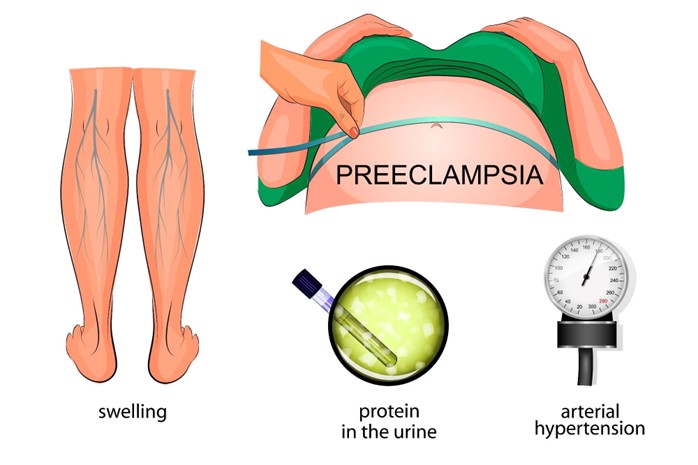When is it most important for the nurse to assess a pregnant client's deep tendon reflexes (DTRs)?
When the client has ankle edema.
If the client has an elevated blood pressure.
During admission to labor and delivery.
Within the first trimester of pregnancy.
The Correct Answer is B
Choice A reason: When the client has ankle edema, it is important for the nurse to assess for other signs of fluid retention, such as weight gain, jugular venous distension, and crackles in the lungs. However, ankle edema alone is not a specific indicator of preeclampsia or eclampsia, which are conditions that can cause hyperreflexia or increased DTRs.
Choice C reason: During admission to labor and delivery, it is important for the nurse to assess various aspects of the client's health status, such as vital signs, fetal heart rate, contractions, cervical dilation, and pain level. However, assessing DTRs is not a routine part of labor and delivery assessment unless there are signs of preeclampsia or eclampsia.
Choice D reason: Within the first trimester of pregnancy, it is important for the nurse to assess for signs of pregnancy-related nausea and vomiting, bleeding, infection, and ectopic pregnancy. However, assessing DTRs is not a routine part of first trimester assessment unless there are signs of neurological disorders or spinal cord injury.

Nursing Test Bank
Naxlex Comprehensive Predictor Exams
Related Questions
Correct Answer is B
Explanation
Choice A: A 14-year-old client with anorexia nervosa refusing to eat the evening snack is a concern, but it’s not an immediate threat. The nurse can address this issue after dealing with more urgent situations.
Choice B: An 18-year-old client with antisocial behavior being yelled at by other clients requires immediate attention. This situation can escalate quickly and may lead to physical harm or emotional distress for the client.
Choice C: A 16-year-old client diagnosed with major depression refusing to participate in group is a concern, but it’s not an immediate threat. The nurse can address this issue after dealing with more urgent situations.
Choice D: A 17-year-old client diagnosed with bipolar disorder pacing around the lobby might be experiencing agitation or restlessness, but unless they’re showing signs of immediate distress or posing a risk to themselves or others, it’s not the most urgent situation.
Correct Answer is C
Explanation
Choice A reason: Reminding the UAP to apply a fitted respirator mask before entering the client's room is not a necessary action for the nurse to take. A respirator mask is a type of personal protective equipment (PPE. that filters out airborne particles and droplets that may contain infectious agents. A respirator mask is required for clients who have or are suspected of having airborne diseases, such as tuberculosis, measles, or chickenpox. Influenza is a respiratory disease that is transmitted by droplet contact, not by airborne contact.
Choice B reason: Instructing the UAP to notify the nurse of any changes in the client's respiratory status is not a specific action for the nurse to take. Respiratory status is an assessment of the client's breathing pattern, rate, depth, effort, and oxygen saturation. Respiratory status can be affected by various factors, such as infection, inflammation, obstruction, or injury. The nurse should monitor the client's respiratory status regularly and teach the UAP to report any signs or symptoms of respiratory distress, such as dyspnea, cyanosis, wheezes, or cough.
Choice D reason: Assigning the UAP to provide care for another client and assuming full care of the client is not a feasible action for the nurse to take. The nurse should delegate tasks according to the scope of practice, competency, and availability of staff. The nurse should not reassign staff without a valid reason or without consulting with other team members. The nurse should also not assume full care of a client unless it is necessary or appropriate. The nurse should supervise and evaluate the UAP's performance and provide feedback and guidance.
Whether you are a student looking to ace your exams or a practicing nurse seeking to enhance your expertise , our nursing education contents will empower you with the confidence and competence to make a difference in the lives of patients and become a respected leader in the healthcare field.
Visit Naxlex, invest in your future and unlock endless possibilities with our unparalleled nursing education contents today
Report Wrong Answer on the Current Question
Do you disagree with the answer? If yes, what is your expected answer? Explain.
Kindly be descriptive with the issue you are facing.
